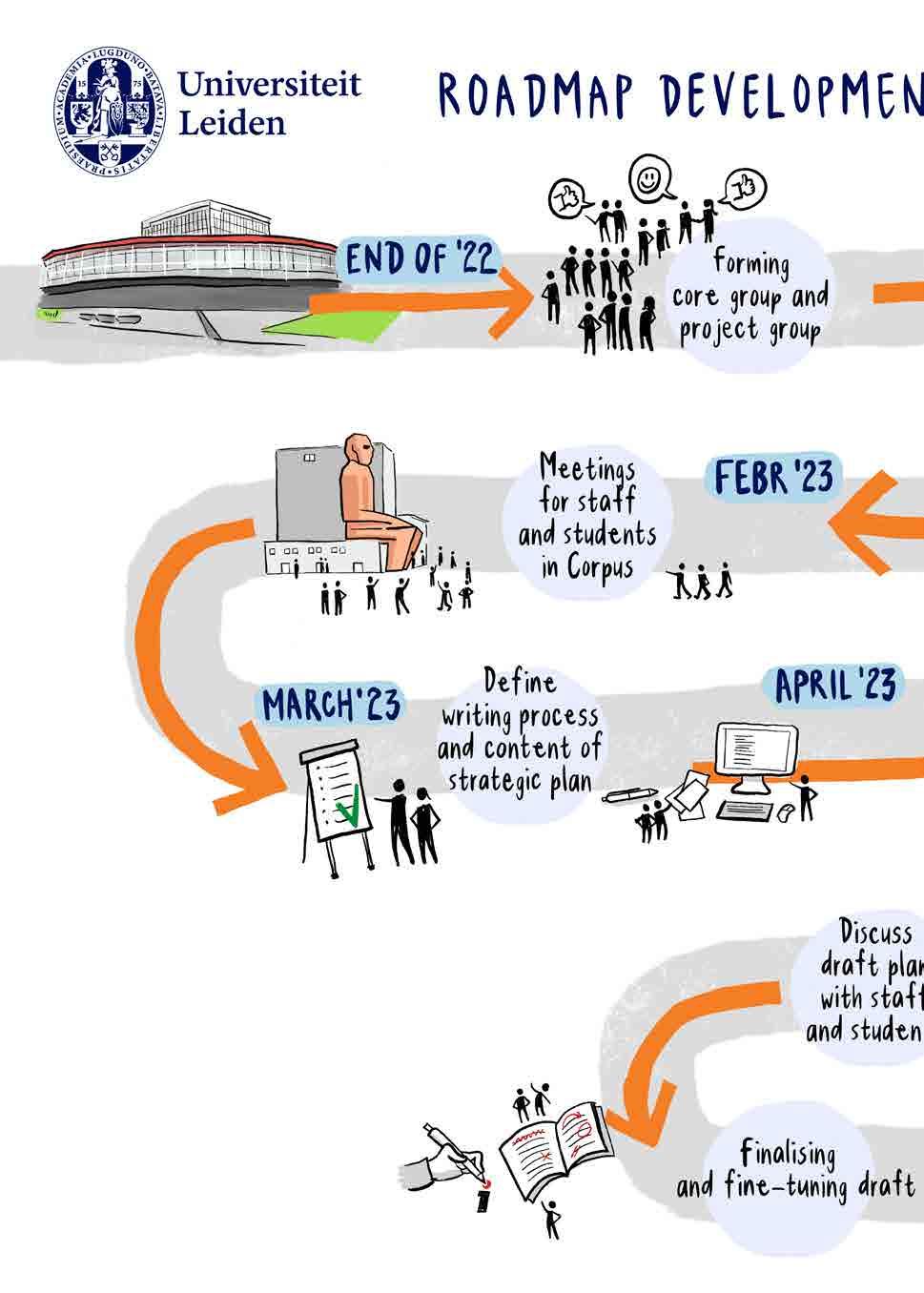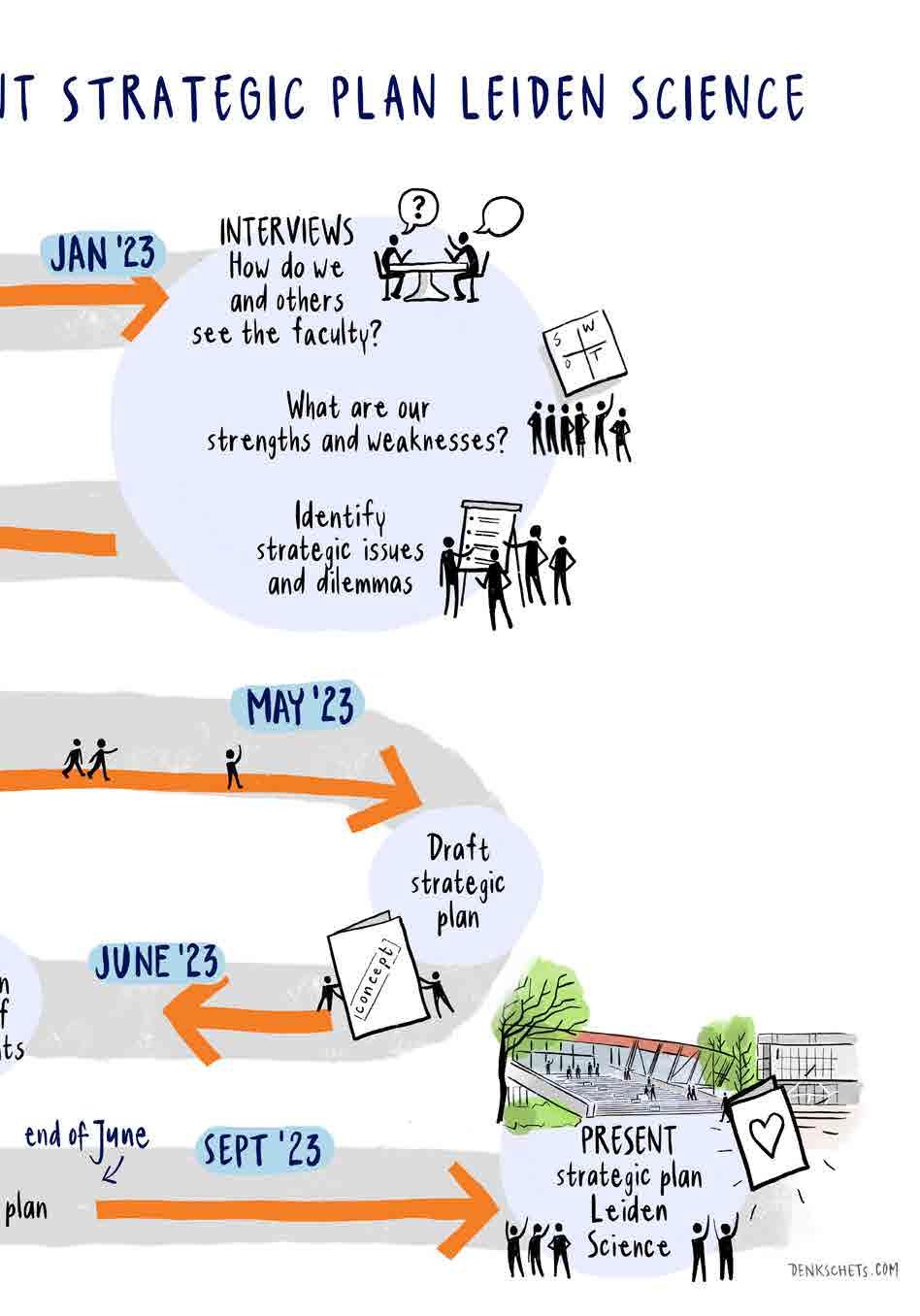Strategic Plan Faculty of Science 2023 – 2028
Connecting through Curiosity
colophon www.universiteitleiden.nl/en/science communicatie@science.leidenuniv.nl Einsteinweg 55 2333 CC Leiden Follow us on social media July 2023
Foreword
We are proud to present the new strategic plan of the Faculty of Science ‘Connecting through Curiosity’ 2023-2028. We are proud of the content, the direction that we have determined together and above all we are proud of the way the strategic plan has come about: by connecting with one another through our curiosity and our shared passion for science to set our course for the coming years together.
Staff and students at the faculty, colleagues from the university, partners and stakeholders from outside our faculty have participated enthusiastically and inspired us and each other over and over again: about what connects us, where our strengths are, what we believe is important and where we want to innovate and improve. During the strategy sessions in the spring and the subsequent consultation sessions, the enormous commitment and enthusiasm to work together on our fantastic faculty were abundantly clear. We regard this as a major asset and are thankful for every contribution that we were fortunate enough to receive during the process that led to this strategic plan.
Thanks to joint efforts, we now have a clear course that sets the direction for the coming years and enables us to make good choices during that course. We would like to thank everyone who contributed ideas and worked on the strategy, and look forward to realising our course together over the next five years!
On behalf of the Faculty of Science community, the Faculty Board
Jasper Knoester
Bart de Smit
Suzanne van der Pluijm
Ava Bauer
3 STRATEGIC PLAN FACULTY OF SCIENCE 2023 – 2028
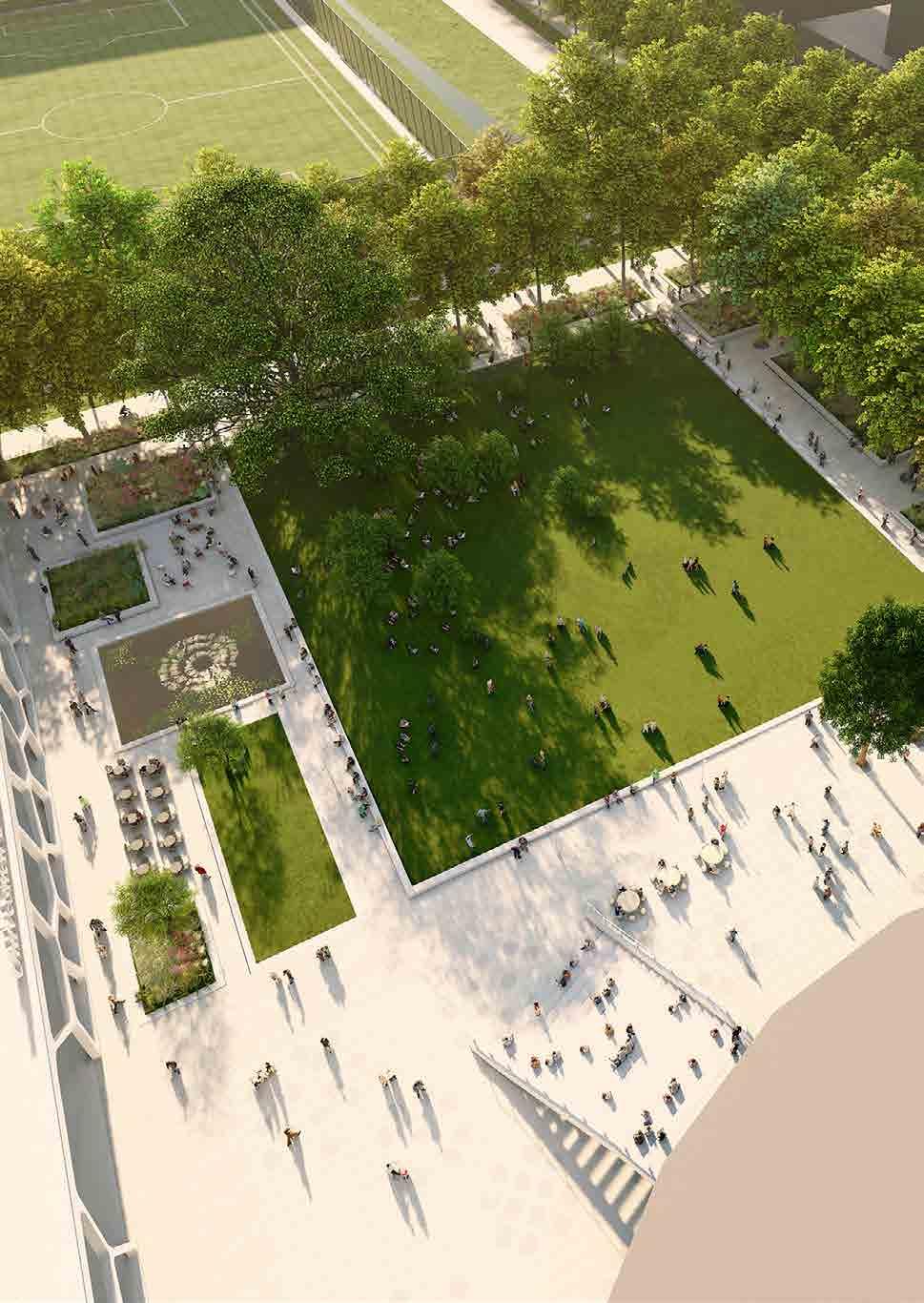
4
Content Foreword 3 1 Introduction 7 2 About us 9 Who we are 9 Our core values 9 What we value 10 Our course 13 3 Opportunities for talent and development 15 Recruitment and career agreements 15 Onboarding: a warm welcome 15 Recognition and rewards and evaluating diverse talents 15 Leadership 16 Career support for PhD candidates and postdocs 17 4 Getting the basics right 19 New management model 19 Contemporary operational management 20 5 Our education 23 Our vision on education: connecting education and research with a view to the future 23 Bachelor’s and master’s programmes as the basis for lifelong learning 23 Broad horizon for extra challenges 24 Our alumni and lifelong learning 24 Quality and innovation in education 24 Supporting and connecting teaching staff 25 6 Our research 27 Connection and impact through interdisciplinarity 27 Disciplinary knowledge base remains essential 29 Broaden the impact of our research and make it more visible 29 Support for grant applications 29 Collaboration and cost efficiency in research infrastructure 30 7 Our ecosystems 33 Added value from collaboration and investing in relationships 33 Regional collaboration 33 National collaboration 34 International collaboration 34 Bringing the outside world in; active relationship management 34 8 From strategy to realisation 37 5
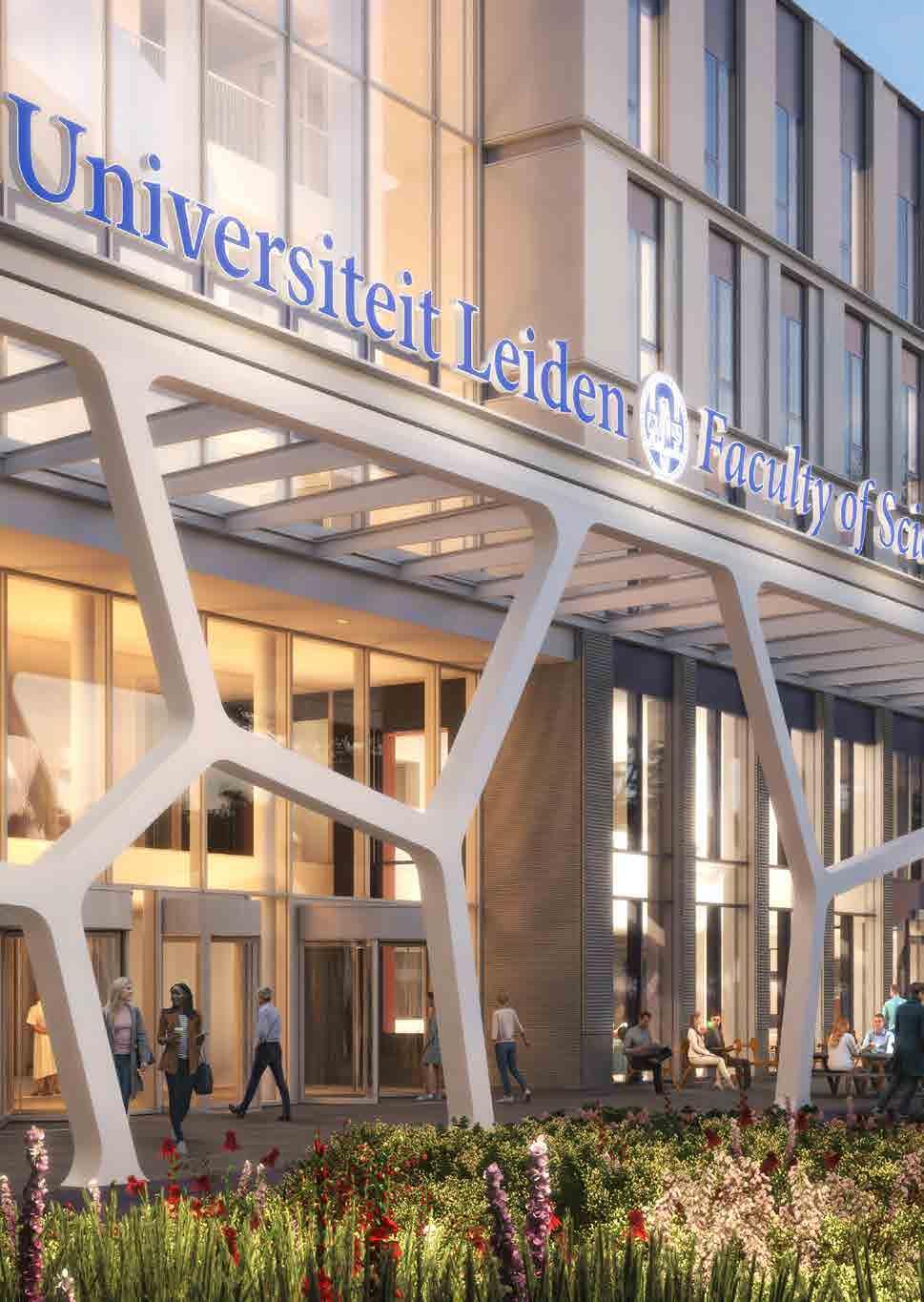
6
Our faculty has undergone strong growth over the past ten years. We are delighted with this development because it means that more students find their way to our degree programmes and we are able to conduct more research. However, growth also brings challenges. Staff numbers have not increased in proportion to the student numbers, and this has an effect on our staff and on our organisation. It is important that we bring our organisation and our processes in line with our growth.
Our strong growth derives from a world around us that is changing rapidly. As a result, there is a continuing demand from society for knowledge and expertise from the science domain. The mindset is also changing: there is a collective desire for a world that is more just, inclusive and sustainable. Our faculty is able and wants to contribute to this. The faculty strategy guides us in how we deal with the effects of growth and the ongoing changes in the world around us. It sets out the main lines of our future course. Together, we will flesh these out in the coming years, in line with the needs of the time and the challenges we face.
Our mission is to provide excellent research and teaching, with a strong mutual interconnectedness and rooted in curiosity. In fulfilling this mission, we are committed to making significant contributions to society and devise solutions to major societal challenges. We believe that we can best accomplish this mission by creating a safe and stimulating environment for our staff and students. An environment where people work and study with pleasure and passion and where making connections, among one another and with parties outside the faculty, is a clear choice.
This strategic plan determines the future course and direction for our faculty, but is, of course, also part of the bigger picture: the strategic plan of the university and that of the other faculties.
We look forward to a future in which we will continue to develop together and nurture our curiosity. A future in which we contribute to the world around us through our education and research.
Introduction
7 STRATEGIC PLAN FACULTY OF SCIENCE 2023 – 2028
Together we are Leiden Science. We are proud of our diverse and international community and work together to create an inspiring work and study environment where meeting one another and working together are at the heart of what we do.
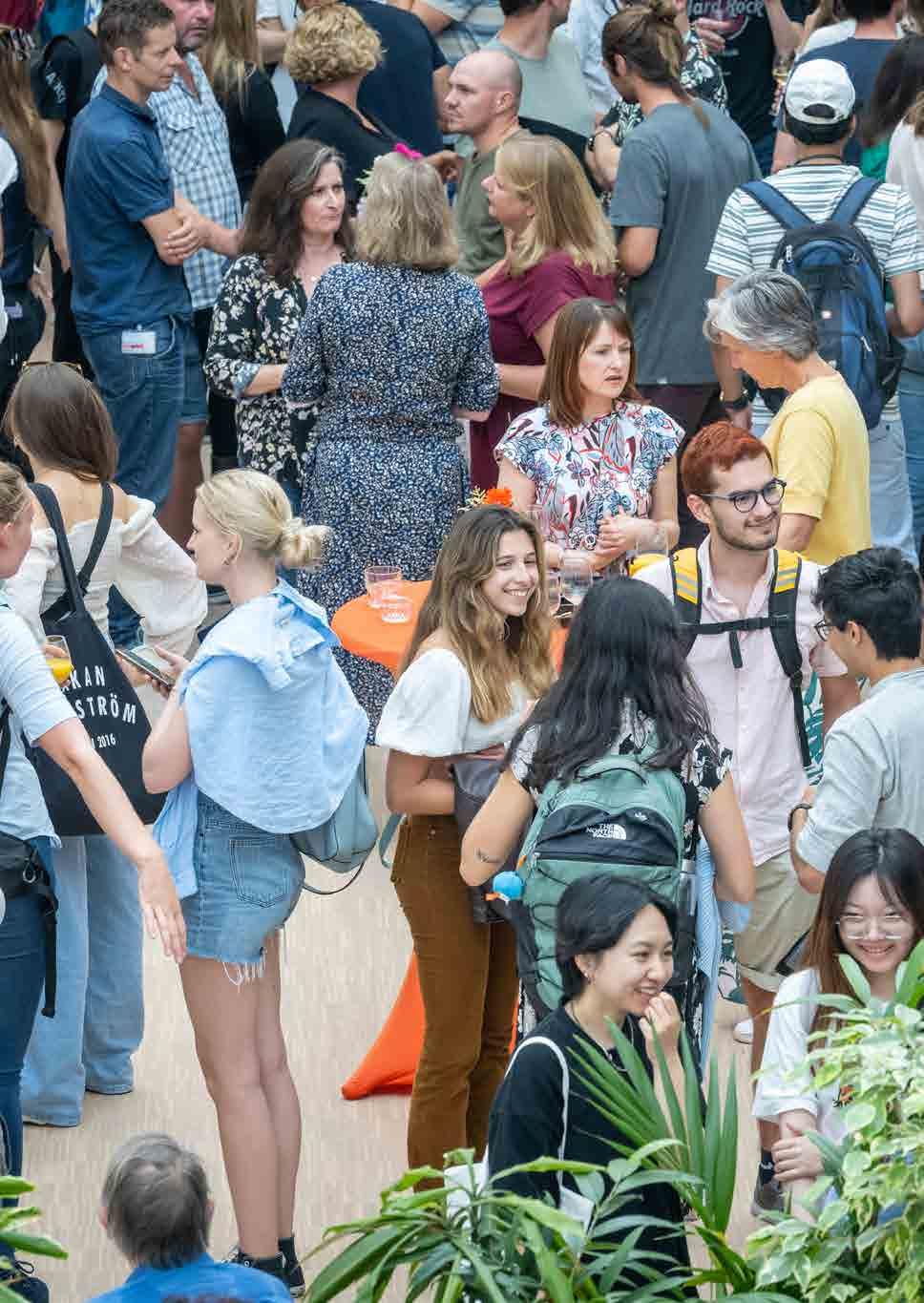
8
About us
Who we are
Curiosity and passion for science are what connect the people in our community: the desire to know, understand, explain and create are in our DNA. With their open mindset and enthusiasm, our staff ensure every day that our education and research are of the highest quality. Together, we create a climate where students and staff can develop to their full potential and where our scientific research and teaching can flourish. We are an international faculty where people from different backgrounds and with over seventy different nationalities work on education and research across the full breadth of the sciences. Our disciplinary institutes, together with the Lorentz Center and the Hortus botanicus, form the backbone of our faculty, with numerous interconnections among them. We cherish the international and diverse nature of our community: it enriches our education and research and brings inspiring and unique perspectives.
Our core values
Our motto is Praesidium Libertatis, bastion of freedom. Freedom of thought and freedom of expression are essential for good scientific research, good teaching, and successful learning and development. However, freedom always goes hand in hand with responsibility, for ourselves, for each other and for our contributions to society. The core values of the university - free, responsible, innovative and connecting - resonate strongly in our faculty. Here we put curiosity at the heart of this as a strong connecting value.
These core values are of equal weight and they guide our behaviour and actions, the choices we make and the collaborations we enter into. They determine the way that we want to achieve our goals and ambitions together, supporting our strategic aims and the movement required to achieve them.
9 STRATEGIC PLAN FACULTY OF SCIENCE 2023 – 2028
Connecting
Being part of a greater whole. Being successful together. Listening to one another and to society. Working together and contributing actively.
Innovative
Seeking new knowledge and insights. Improving what can be done better. Shifting boundaries. Being curious about one another and about the unknown.
Curious
Wanting to know, understand, explain and create.
Responsible
For promoting an inclusive community. For practising science with integrity. For what we say and do and how we behave towards one another. For our role in society.
Free
Independent enquiry. Room for different perspectives and ideas, for open dialogue, for unfettered research.




What we value A connected, inclusive community
We believe that a diverse community is important because research and teaching thrive best when ideas and achievements are brought together from diverse backgrounds. Diversity relates to gender, cultural background and nationality. We are aware that diversity cannot exist without inclusion and that there can be no inclusion without connection. We therefore strive to make our faculty a welcoming and open meeting place for all, filled with inspiration, knowledge sharing and opportunities for development.
10
We do this by:
• Encouraging and supporting inclusive networks and platforms where people at similar life and career stages and with similar challenges can meet and share experiences. These include networks for PhD candidates, ‘early career’ researchers and support staff. A good example of a platform that already exists in our faculty is RISE, our network of women scientists.
• Promoting the integration and inclusion of international staff and students in the organisation, by providing better onboarding and involving them more closely in the organisation through memberships of working groups, committees, boards and participation bodies.
• Paying structural attention to bilingualism in the organisation and developing intercultural skills and awareness of unconscious bias.
• Organising knowledge and inspiration sessions, such as meetings addressing specific research and education themes, as well as lectures focusing on culture and behaviour and topics such as diversity and inclusion. We will breathe new life into our ‘This week’s Discoveries’ where scientists share new insights from their research.
• Organising six-monthly management conferences.
A place to enjoy working and studying
Everyone is welcome at our faculty. We pay constant attention to building a culture in which we encourage everyone to work together openly and pleasantly and in which everyone has a clear role. Trust and safety are key words here: trust in the knowledge, skills and commitment of colleagues and (fellow) students; and a safe place to talk to each other, where mistakes are allowed. We expect leadership from our people, and we therefore invest in learning to manage staff and acquiring the skills for self-management. We believe it is important for students and staff to have a socially safe study and working climate where they dare and are able to have a conversation with each other about what this means in terms of behaviour. Socially unsafe behaviour is not tolerated at any level. To underline this, we organise training courses to help people identify and flag such behaviour, and work to promote a culture in which it is possible to discuss behaviour. Everyone has a role to play in creating a socially safe environment, and managers have an explicit role model function here. We expect everyone, from students to professors, to take responsibility for each other and for the bigger picture.
Well-being
The well-being of our staff and students is key. Reducing the workload is an important part of this agenda. In the recent personnel monitor, employees indicated that they regularly experience excessive work pressure. We will work to improve this in the coming strategic period and to ensure a good work-life balance. Job satisfaction increases productivity and makes the pressure of work less likely to turn into job stress. We have regular discussions with employees,
11 STRATEGIC PLAN FACULTY OF SCIENCE 2023 – 2028
in work meetings, annual appraisals and via the personnel monitor to gauge whether we are successful in this. We make choices together about what is and what is not done at work. We address operational processes and procedures that can be more efficient and remove administrative bottlenecks.
In terms of student welfare, the prime focus of the university is on prevention, a policy that our faculty fully endorses. In addition, we are making efforts to make administrative processes as clear as possible for students and are further aiming to provide mentoring programmes for every undergraduate programme.
Working together on a sustainable faculty
We aim to be a ‘green’ faculty where sustainability is paramount and where, building on our research strengths, we work towards the United Nations’ Sustainable Development Goals (SDGs). This is what our staff and students want, and it is also what our environment expects of us. Together with our staff and students, we are taking significant steps towards this in the coming strategic period. We are formulating an action plan for our faculty in which we work to raise the awareness and commitment of our community to become more
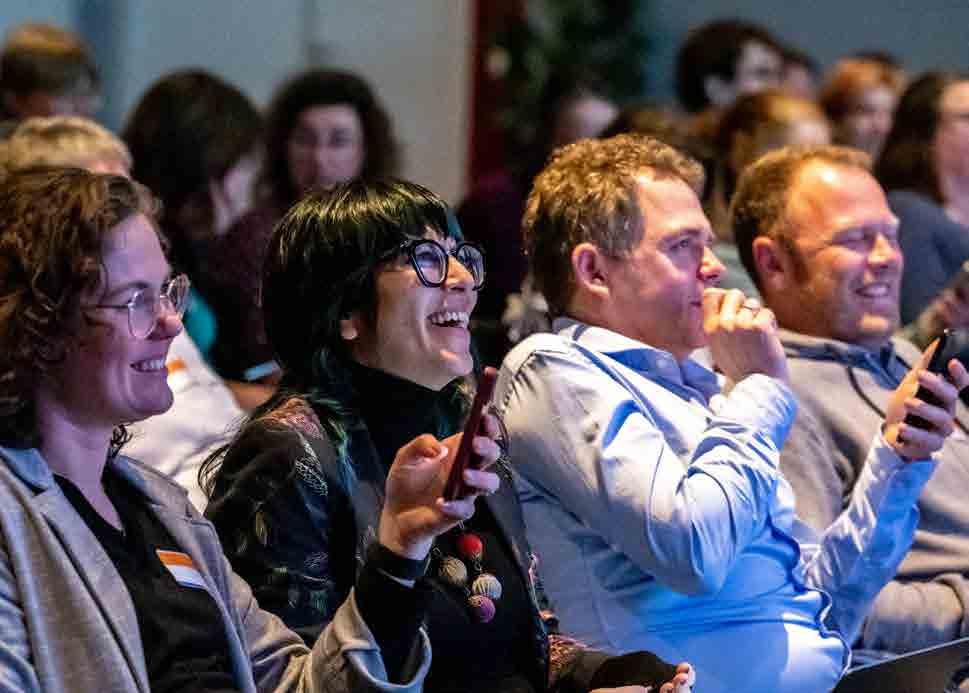
12
sustainable as well as to achieve concrete goals: limiting energy consumption, minimising waste and reducing our water consumption. These activities are in line with the university’s sustainability initiatives and with partners in our region, such as the Leiden municipality. We will use think tanks, brainstorming and focus groups composed of staff and students from all levels of our faculty to achieve our aims. In the context of sustainability, we also give careful consideration to the choice of collaboration partners in our research and teaching.
An inspiring environment
Seeing one another, meeting and working together are important. This is integral to our core values and is crucial in inspiring new developments. The work and study places on campus must facilitate this and promote inspiration, with the home office as an alternative when it benefits specific activities or contributes to a better work-life balance. The faculty - in cooperation with the Real Estate directorate - is strongly committed to the further development of the Science Campus over the coming years, and from that perspective the aim is to further develop buildings on campus for, among others, the CML and IBL. The further optimisation of the Hortus location is also an area of attention.
Our course
We translate the core values of ‘connection’ and ‘innovation’ into verbs: connecting and innovating, based on curiosity. They form the core of our direction in the coming strategic period. Our community is central to this. Our strategy is guided by a number of key actions: creating opportunities for talent, getting the basics right, connecting and innovating in our education and research, and developing and strengthening cooperation in the ecosystems of which we are part.

13 STRATEGIC PLAN FACULTY OF SCIENCE 2023 – 2028
We will develop transparent career tracks for people with talents in education, research and support, to promote personal development and leadership.
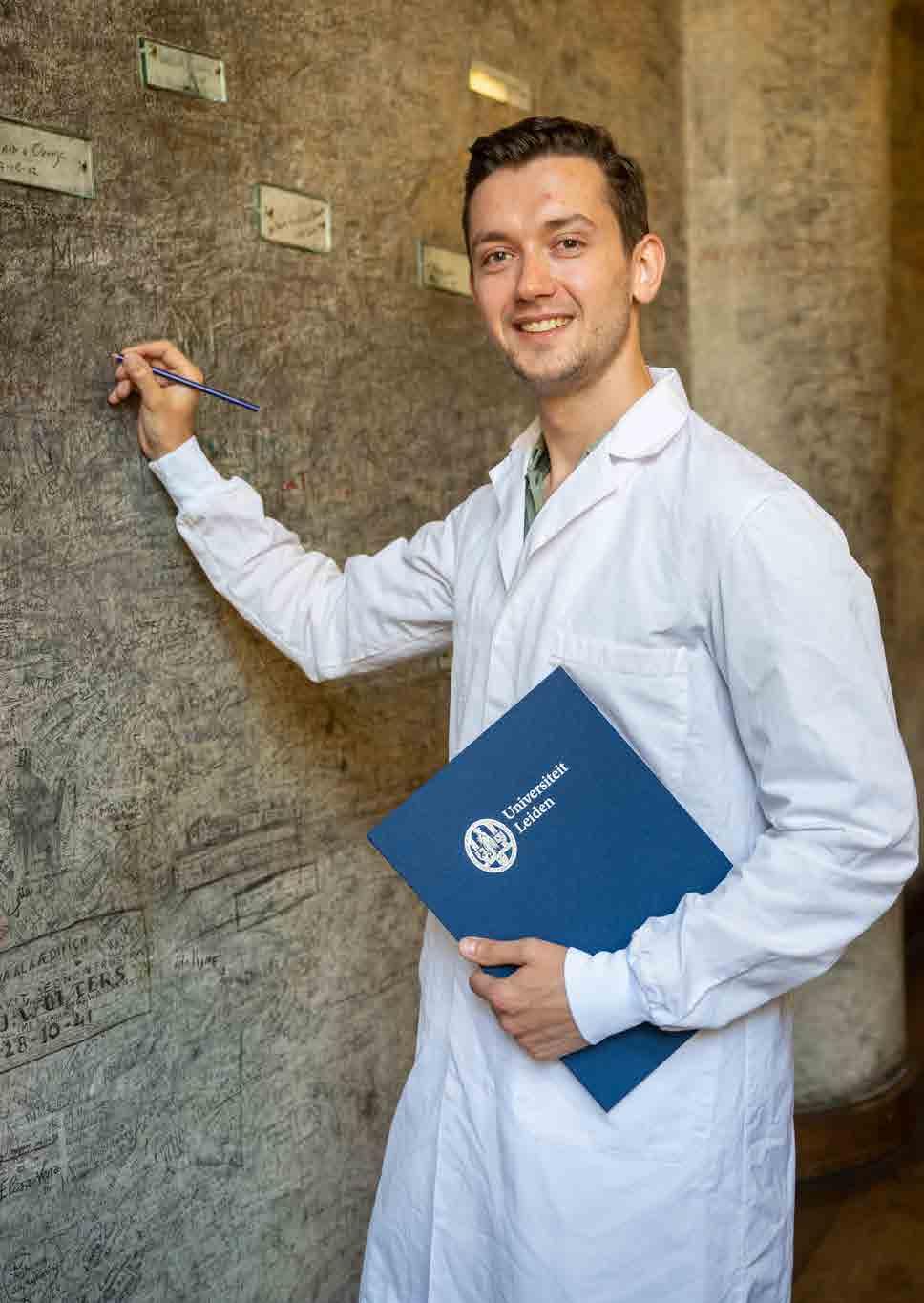
14
Opportunities for talent and development
Our faculty flourishes thanks to the knowledge and experience of our staff. Every day, based on their expertise, they use their talents to contribute to our excellent international reputation, the success and results of their own team and our faculty as a whole. Our staff are our greatest asset, and guiding their professional development to allow their talents to flourish deserves our full attention.
Recruitment and career agreements
Open and transparent recruitment of academic and support staff, with an eye for the talents of all candidates, is a prerequisite for long-term success. We ensure we have in place clear job profiles and descriptions, diverse selection committees (trained in unconscious bias) and good faculty recruitment protocols.
Development opportunities and career agreements are discussed during the recruitment process and recorded in writing upon appointment, together with assessment criteria. We are committed to having uniform career paths and promotion criteria. This way, employees in comparable positions are given equal opportunities regardless of gender, nationality or cultural background.
Onboarding: a warm welcome
We make efforts to help new employees find their way in our organisation and feel at home as quickly as possible. This gives them the best chance for a good start and also promotes a sense of community in the faculty. The institute or department takes the initiative and assigns a buddy as the first point of contact. Aiming for the faculty to be a meeting place and supporting and facilitating networks and platforms, as described in ‘What we value’, play a key role in onboarding new members of staff.
Recognition and rewards and evaluating diverse talents
The faculty needs a wide range of talents and expertise. We will achieve the optimum results if we get the best out of the combination of all our staff by promoting collaboration. Everyone has different talents, interests and development paths. For academic staff, the diversity mentioned above has received much attention in recent years in the Recognition and Rewards initiative. As a faculty, we embrace this initiative and will explore how to extend it to all staff.
15 STRATEGIC PLAN FACULTY OF SCIENCE 2023 – 2028
We will amend our career policy for academic staff in the light of the principles of Recognition and Rewards, in which important principles will be transparency in career policy, rethinking of assessment criteria for teaching, research and contributions to the organisation, and variation in the weighting of these three result areas based on individually defined agreements. This will increase career opportunities for staff with a stronger interest in teaching and educational innovation than in research. Recognition and Rewards also includes new assessment standards, for which we will draw in part on the insights of the university’s Academia in Motion initiative.
For support staff, we will explore the development of career paths and criteria for recognising and valuing performance and results. This also includes a good range of courses to further develop talents. The faculty wants to move forward with this in the coming strategic period, in close consultation with the staff. We will press for a university-wide or even cross-university approach that can provide more opportunities in careers.
Promoting the development of individual talents is the focus of continuous attention from employees and managers, and agreements are recorded in annual performance and development interviews. We value feedback from multiple perspectives, such as 360-degree feedback and development assessments, and will facilitate and introduce instruments that serve this purpose. In addition to individual performance, we also look at a person’s contribution to the bigger picture.
Leadership
Leadership is a core competency expected of everyone in our faculty at the level appropriate to their career stage. Fundamentally, we expect personal leadership from everyone, which means taking responsibility for one’s own development and actions. For managers, successful leadership includes being responsible for managing and connecting teams and organisational units and inspiring the staff they supervise. This also includes leading by example and discussing behaviour, and maintaining collegial and constructive relationships with other units. Because everyone is expected to develop and demonstrate leadership, this will become an important parameter in appraisals. To better support and facilitate our managers in this, we will develop a range of training courses within the faculty.
Besides leadership, mentoring younger staff is also an important role for our more experienced professionals, in both academic and support roles. A more structural commitment to this will receive attention in our career policy.
16
Career support for PhD candidates and postdocs
PhD candidates and postdoctoral researchers are invaluable to our research and teaching. They must be given sufficient opportunities to orientate themselves and prepare for their next career step, within or outside academia. We will support them better in this respect through training in general skills and competences, peer review and knowledge sharing.
Actions
• Align with the principles of Recognition and Rewards. Design a transparent and uniform career policy where the focus is on recognising and valuing the diversity of talents and interests. Set up a committee to advise the Faculty on implementation, in the first instance for academic staff.
• Extend the principles of Recognition and Rewards to support staff, and provide them with opportunities for personal and professional development, and for growth and advancement.
• Make leadership a more important assessment criterion in career development. Establish an appropriate faculty learning path for this.
• More active support for scientific staff in temporary positions, PhD candidates and postdocs, in the orientation and preparation for their further career.
17 STRATEGIC PLAN FACULTY OF SCIENCE 2023 – 2028
We will get the basics right by making clear agreements about tasks and responsibilities, reviewing our operational management processes and optimising them smartly.
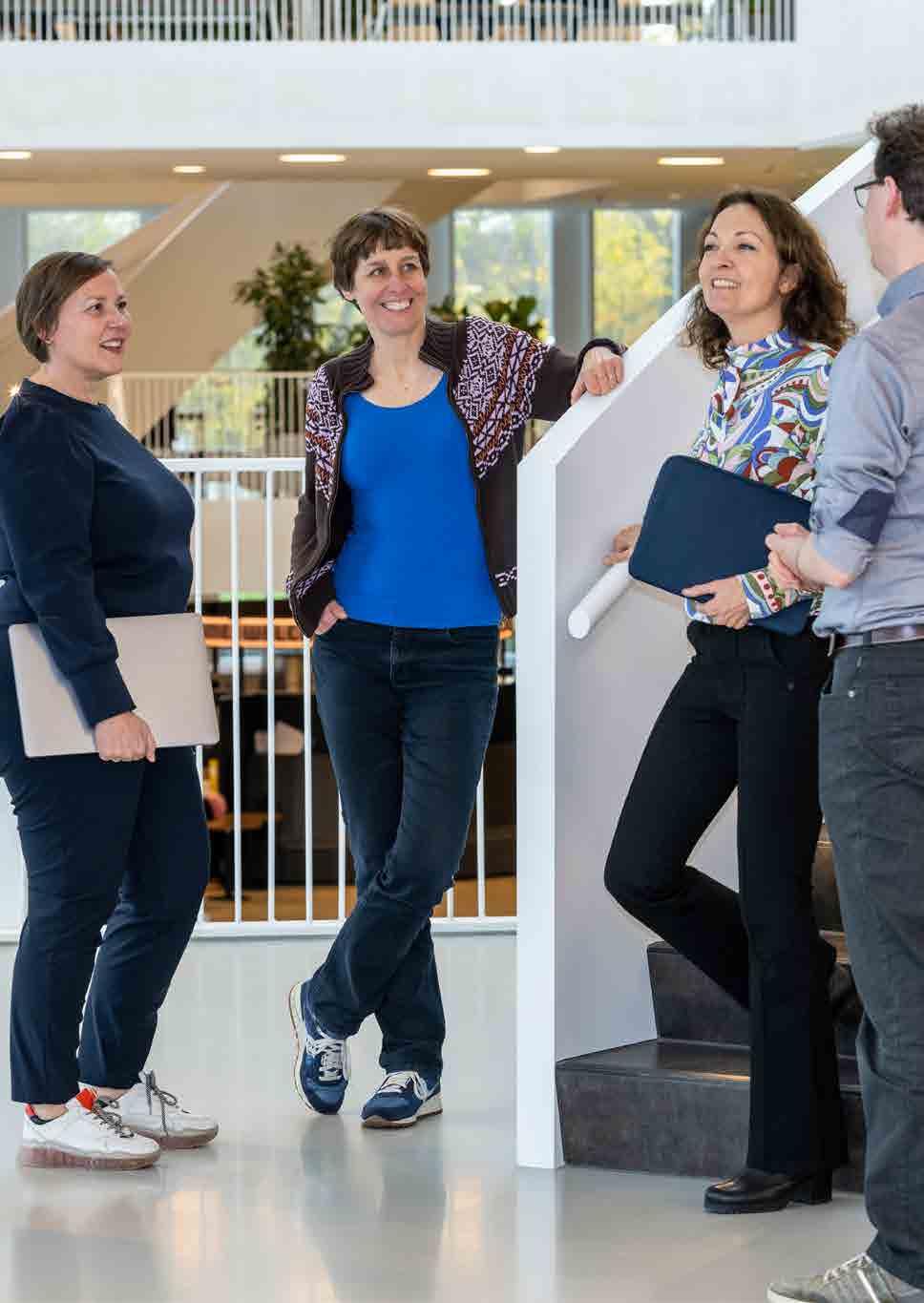
4
18
Getting the basics right
Periods of growth and change call for a contemporary management model and a solid and effective design of operations based on transparent processes and procedures, clear decision-making and responsibilities. This helps to reduce the perceived workload and meets the call for better support for staff and students. In addition, there is an increasing need for external accountability in areas such as finance, data management, ethics and collaborations with industry and international parties. The way we structure our organisation has to reflect these developments, make our organisation agile and empower our staff, students and management boards.
Working on getting the basics right in the context of our strategy provides answers to:
• The need for connection: shared management and shared responsibility, pooling expertise and knowledge from across the organisation. By doing this, we strengthen our position in the university community and in the outside world.
• The needs of our employees for consistent HR policies and clear and transparent processes and procedures. Reducing bureaucracy and simplifying administrative operations contribute to a good work-life balance.
• The growth we have experienced. More research and more students means our organisation has to be structured differently.
• Developments in society. Sustainability is at the core of our activities and our processes.
New management model
We will further professionalise our management structure, putting transparency and cooperation at the core. Tasks and responsibilities will be clear and workable at all levels in the faculty. Institutes will be given optimal scope within the administrative, organisational, legal and financial frameworks of our faculty and university. In the institutes, we will work with collegiate institute boards. Three board members with their own portfolios will together have integral responsibility for research, education and operations at the institute. The new institute boards will function as a mirror for the Faculty Board. We will adapt our consultation structure in line with our new management style: we will consult less frequently, but more efficiently by ensuring more careful preparation and with agendas for the various bodies that are fully in line with one another. Participation bodies at all levels - faculty council, programme committees and institute councils - play an important role as discussion partners for boards and are regularly informed and consulted. We strive for good interaction between the various participation bodies in order to achieve greater interconnection on important faculty developments.
19 STRATEGIC PLAN FACULTY OF SCIENCE 2023 – 2028
Contemporary operational management
Starting from an integral operational management programme, we will use a project-based approach to ensure that our operational processes are clear and workable. We want to place tasks where they add the most value and fit best in the organisation. We will do this with and for our community, by involving staff and students in our projects. Participation bodies will be involved in our plans. We will carry out a sustainability test for each process as part of our striving to make an optimal contribution to our sustainability objectives.
The Faculty of Science is working on its own digital transformation strategy. We will identify the ICT infrastructure and associated specialised hardware, software, skills and services that are needed to best facilitate our teaching and research. We will do this in cooperation with colleagues from the university’s staff departments and expertise centres, thus creating an environment of mutual inspiration and knowledge sharing.
The teaching in our programmes will improve as we optimise our administrative processes, leaving more time and space for content within the programmes and

20
reducing the workload. To support our lecturers and students even better, we will align the operational aspects of education as much as possible and facilitate them from the faculty level. We will do this together under the direction of the faculty organisation in the integral operational management programme.
Our research is often dependent on expensive infrastructure. To better bear the costs of management, operations and investments and to promote cooperation, we encourage institutes to organise this jointly. You can read more about this in ‘Collaboration and cost efficiency in research infrastructure’.
As an important step, before we start a project, we check whether there are sufficient staff and resources to implement the project, both in the project phase and in final management. To this end, we will make better management information available to our boards. We will also develop tools to support decision-making. One of these tools is the implementation agenda that accompanies this strategic plan. It provides insight into which projects are still to follow and helps us set priorities and make choices. With each new project, we ask ourselves: where is the benefit for the organisation and what is the effect on the workload for our employees?
Actions
• Further professionalise the management structure of the faculty by working with collegiate institute boards.
• Work with a contemporary operational management system:
– place support and administrative tasks where they will be most effective in the organisation;
– simplify and improve processes as a means of reducing workload;
– improve the sustainability of our processes.

• Better facilitate the IT needs of the staff, students and service departments in our organisation.
• Organise collaboration and cost efficiency within our research infrastructure.
21 STRATEGIC PLAN FACULTY OF SCIENCE 2023 – 2028
We invest in our teaching community, where lecturers are given the opportunity to innovate, and students with a strong disciplinary basis and a broad outlook are prepared for the dynamic challenges of the future. Our research-driven approach is key.

5
22
Our education
Our education brings a natural science perspective to current societal issues and challenges. These include sustainability, biodiversity, more effective and safer medicines, the development of quantum computers, artificial intelligence and the exploration of the universe using state-of-the-art telescopes. We pride ourselves on the strong connection between our teaching and research practice and the interaction between students and scientists. Excellent research and passionate teaching in an international and diverse learning environment is what we stand for.
Our vision on education: connecting education and research with a view to the future
We prepare our students for a future in which they can contribute as professionals with a proactive and ambitious attitude to solving fundamental and societal issues, within and outside academia, and to approach fundamental and applied issues as researchers. This requires them to possess a broad pallet of academic skills: from analytical thinking, problem-solving ability, careful reasoning and acting ethically and with integrity, to oral and written communication skills, working in teams and dealing with different perspectives. Further development of our Science Skills project will help our students build on these skills.
We believe it is important to offer students the opportunity to experience our faculty’s cutting-edge research. Research projects in both the undergraduate and graduate phases therefore remain important components of our study programmes, even with today’s high student numbers. In addition, we want to offer our students the opportunity to interact with research in industry. The unique location of our faculty on the Leiden Bio Science Park (LBSP) and our partnerships in a broader context offer ample opportunities for this. More and more students are taking advantage of this, but they often do not have a full understanding of the possibilities, and procedures are often still laborious. Together with companies and the Unversity of Applied Sciences Leiden, we are going to improve the procedures needed to do internships in the business sector.
Bachelor’s and master’s programmes as the basis for lifelong learning
We believe that a strong, disciplinary foundation during undergraduate studies is the cornerstone for students’ further development. Our master’s programmes offer a wide range of specialisations: research-oriented in the main discipline, or multidisciplinary, or societally oriented, with learning paths tailored for each student. We train students to make their own choices and follow a study path that suits their career ambitions and with a view to the labour market.
23 STRATEGIC PLAN FACULTY OF SCIENCE 2023 – 2028
Broad horizon for extra challenges
We believe it is important to offer education that is accessible, and that aims to broaden students’ horizons and matches their talents. We want to offer motivated students additional challenges, which is why we are committed to reorienting the honours programme and making it more widely accessible. We work closely with the TU Delft and Erasmus University (LDE). We have two joint bachelor’s programmes with TU Delft, two master’s programmes and a number of LDE minors. We want to encourage our students to look beyond the boundaries of our own programmes and be curious about other fields of study that broaden their perspective. We will therefore work to remove existing administrative barriers and provide broad-based education together with the LDE organisation.
Our alumni and lifelong learning
We value contact with our alumni. They are an important source of inspiration and information for students as they prepare for the job market. Given the rapid changes in society and the labour market, we also feel a responsibility to offer our alumni opportunities for continuing education at our faculty. Together with alumni and the wider work field, we will therefore explore the interests and possibilities for this. We are looking to connect with national initiatives such as the National LLO Catalyst and want to experiment with pilots in the field of education for professionals, for example in the area of artificial intelligence.
Quality and innovation in education
At our faculty, the programmes themselves determine the content and didactics of their teaching, in line with the vision of the university and the faculty. High-quality standards are important to us, which is why we are committed to evidence-informed educational improvement and innovation. To this end, we create space to experiment bottom-up with educational innovation projects, encourage lecturers to conduct research into the effects of educational interventions and facilitate knowledge sharing between lecturers and study programmes. The involvement of students is important to us, via the formal participation with the study programme committees and the Faculty Council, the study associations and informal participation, for example through student consultations. This means that courses can also be improved during their running time.
Interaction between staff and students and among students in an optimal
physical learning environment is an important core value in our education. Digitalisation and blended education offer opportunities to make our education even better, more activating and accessible. We are working towards a campus that facilitates digitalisation in education in a sustainable way and the development of digital competencies of students and teachers. You can read more about this in ‘Contemporary operational management’.
24
Supporting and connecting teaching staff
We believe that you can learn to teach. Even for experienced teachers, it is important to work on their professional skills in order to keep up with the changing student population, new teaching tools and new insights into didactics. We therefore expect an active commitment to developing teaching skills from everyone in a teaching role, from student assistant to professor. We support our teachers by facilitating them in the organisation of their teaching and in working together on teacher development, knowledge building, peer learning and the wider dissemination of best practices. This enhances the quality of teaching and strengthens the sense of community among lecturers.
We do this, for example, with a good range of activities offered by the teacher support desk, tailored to the needs of our lecturers and by setting up Communities of Practice, where we bring lecturers working on educational innovation together for knowledge sharing and intervision on themes such as blended learning, machine learning & artificial intelligence and diversity & inclusion. The growing group of experienced colleagues within our faculty in the field of educational leadership and educational innovation have an important role to play in this.
Actions
• Strengthen the engagement and active mindset of students as owners of their own learning process.
• Strengthen lecturer development and support, including via collegiate intervision, peer learning and communities of practice.
• Strengthen job market orientation and skills pathways in the degree programmes.
• Strengthen collaboration within the LDE alliance and with businesses and institutions on the LBSP.
• Align with lifelong development initiatives and pilots with education for professionals, in consultation with alumni and the professional field.
25 STRATEGIC PLAN FACULTY OF SCIENCE 2023 – 2028
Driven by our curiosity, we contribute to resolving the societal challenges of the present day, and develop new scientific insights for building the knowledge base for impact in the future.
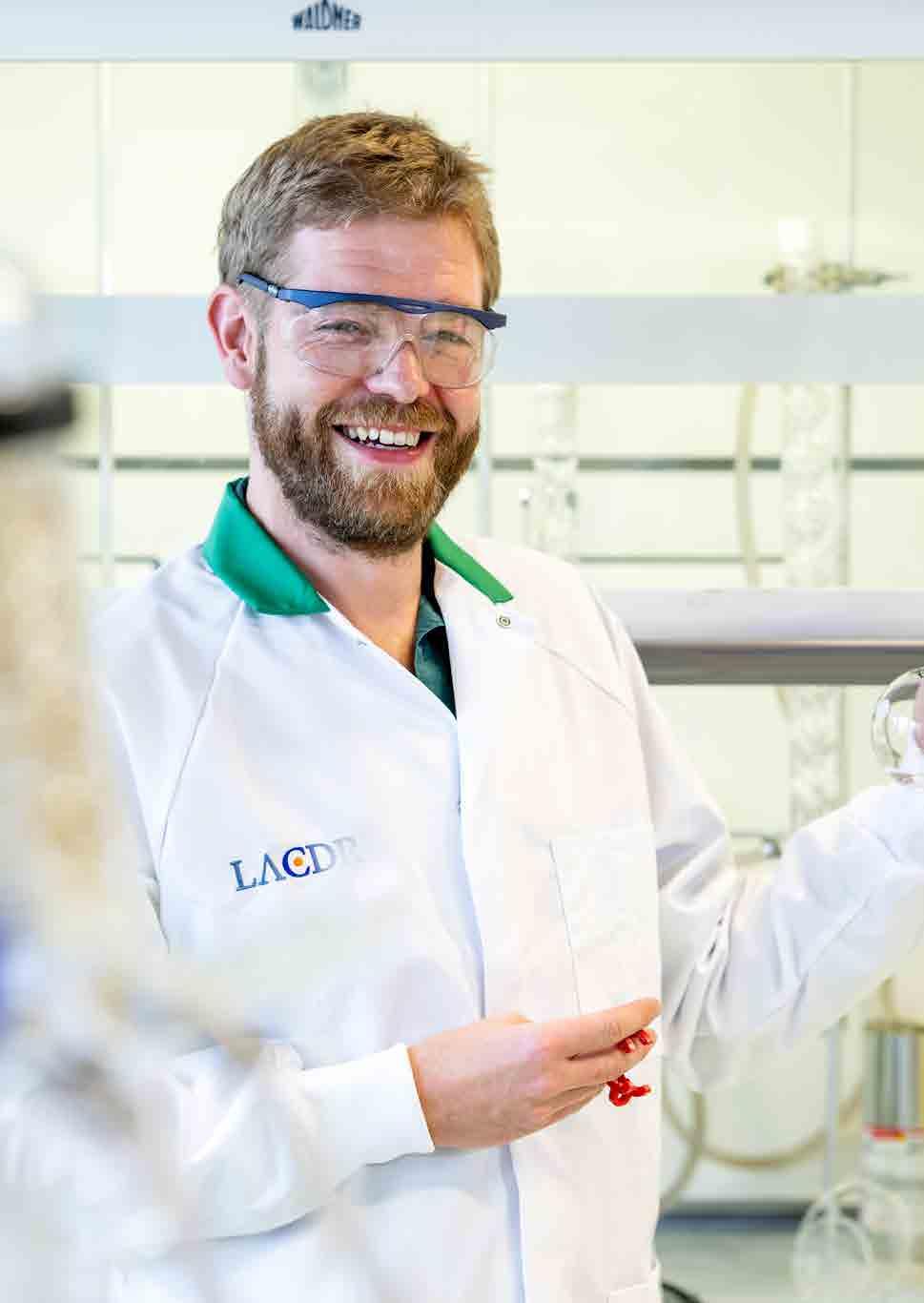
6
26
Our research
Our faculty’s research is world-class. Our research groups operate at the forefront of fundamental science research and play leading roles in important society-driven research programmes. Because of the close connection between our research and teaching, our students receive the latest scientific insights. We are proud that our faculty’s research has grown in both breadth and depth in recent years: there are more publications, more PhD candidates and our position has been strengthened nationally and internationally.
Connection and impact through interdisciplinarity
Our research flourishes through the depth of expertise within disciplines, which makes it possible to achieve important breakthroughs. However, many interesting developments take place at the interfaces between disciplines. Researchers from our faculty have therefore found one another across institute boundaries or started collaborations with groups in other faculties. These partnerships give rise to valuable new fundamental insights. Moreover, in order to find solutions to major societal challenges, it is essential to bring together knowledge and techniques from multiple scientific disciplines.
To increase our scientific and societal impact, we intend to strengthen our interdisciplinary connections and our visibility to the outside world. We will do this by focusing on a number of themes in which the faculty has particular strengths across several institutes (including the Hortus botanicus) and where there are good opportunities for connection with other faculties and with parties outside academia. This promotes interdisciplinary cross-fertilisation and cooperation between and within institutes, and makes our expertise more recognisable to the external partners we want to involve in this research. Together, we have identified six themes:
• Biodiversity
• Complex Networks
• Sustainability
• Artificial Intelligence (AI)
• Drug Discovery and Development
• Quantum & Space
27 STRATEGIC PLAN FACULTY OF SCIENCE 2023 – 2028
We will organise meetings on these themes for researchers from different institutes and (potential) external cooperation partners. At these meetings, they can find out more about expertise relevant to the theme that exists within other institutes and about upcoming funding opportunities in each of these themes. With their expertise in bringing together scientists, the Lorentz Center can fulfil a valuable role here. The content of the meetings is determined by the researchers themselves. We draw up a clear profile, making it evident to the outside world what our faculty has to offer within these themes and increasing our visibility. We aim for our themes to be included in national and international research programmes, such as the National Growth Fund and Horizon Europe. This creates opportunities for our research and increases our impact.
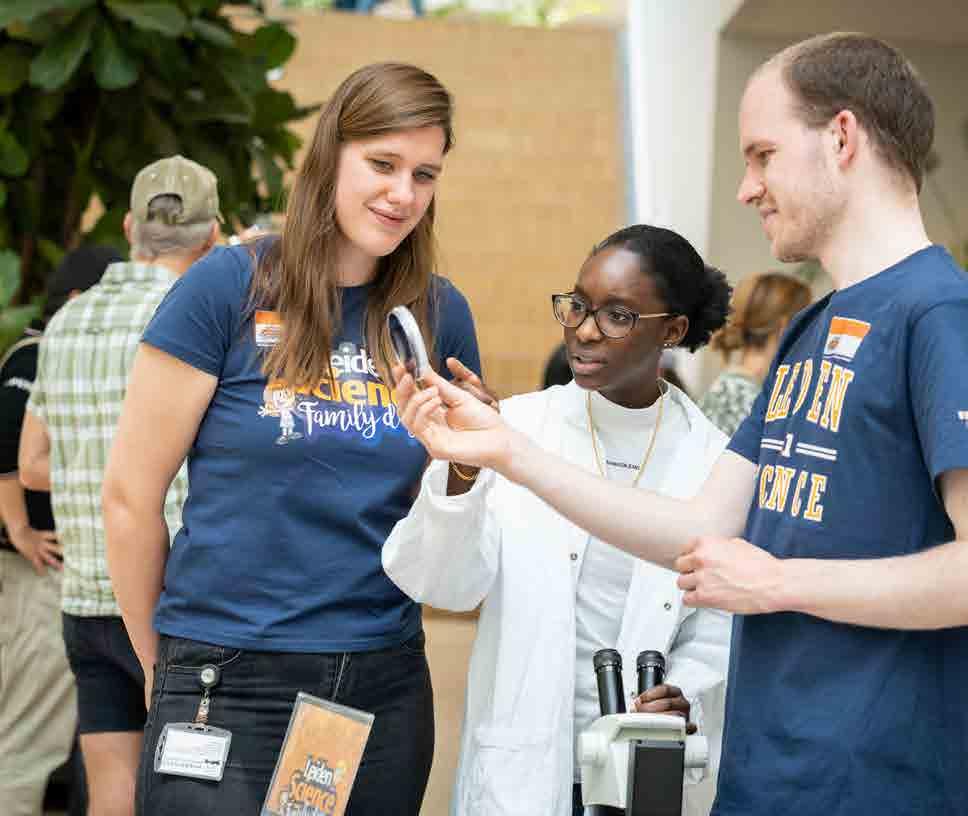
28
Disciplinary knowledge base remains essential
Interdisciplinary research and contributions to major societal questions are not possible without a strong disciplinary knowledge base that we build through curiosity-driven fundamental research. We continue to value, support and strengthen unfettered research, which has traditionally been our strength and pride. In doing so, we lay the foundation for innovation and new themes in the future and for solutions to tomorrow’s societal challenges. The institutes choose the research topics, monitor quality and draw up their research strategy. We bring the strategies together at faculty level. Mutual cross-fertilisation in this process leads to a strong and visible research portfolio.
Broaden the impact of our research and make it more visible
We believe it is important that the results of our research benefit society. Collaboration with societal organisations and industry is essential for this. We therefore want to encourage cooperation with public and private parties and provide sufficient specialised support. Our Knowledge Transfer Office (Luris) is an important link here.
We connect our research with society through our communication. We do this by making our work visible and showing what drives our scientists. We also involve society in science via Citizen Science with such initiatives as the Grachtwacht (Canal Watch), where research is conducted with citizens on flows of plastic in the Leiden canals, and ISPEX, which allows everyone to contribute to particulate measurements using their mobile phone.
We make our research accessible to everyone by opening our doors during events such as the Leiden Science Family Day, organising public lectures, giving information sessions at schools and being present at major events where we showcase new insights and applications of our research. In this context, we will also look at the future of the Junior Science Lab.
From within the Science Communication and Society research group, expertise is available for students and researchers who want to involve citizens in their research, to make use of best practices and connect with relevant parties and complementary projects.
Support for grant applications
We want to provide our researchers with better support when applying for grants, to increase the chance of success and reduce the workload involved in grant applications. Specialised support is available from different units in the university, for example for legal matters, privacy and ethics. Disciplinespecific support is available and easily accessible within the institutes. We want to connect the support available at different levels in a more effective way and increase the visibility and accessibility of specialised support. Together with SAZ
29 STRATEGIC PLAN FACULTY OF SCIENCE 2023 – 2028
Grant Development and Luris, we aim to broaden the support and the provision of information on applications for major grants and cooperation in consortia. Good support also includes the way we handle data storage and the security of research data. In terms of data storage, the existing programme with electronic lab journals and data stewards will be rolled out further. For knowledge security, a vision and working method will be developed at university level, in which awareness and criteria for weighing risks against opportunities are key elements (see Our Ecosystems).
Collaboration and cost efficiency in research infrastructure
Much of our research is dependent on costly infrastructure. To keep the costs of investment and operations manageable and encourage researchers to connect with one another in terms of content, we encourage the institutes to cooperate in managing and investing in infrastructure. To facilitate this we will better identify the needs in the different institutes so that we can recognise and make good use of opportunities for cooperation. We want to encourage the sharing of knowledge and experience, as well as the costs of managing our extensive infrastructure. Together with the institutes, we will develop a faculty vision and policy to achieve this.
Actions
• Connect our research strengths across institute boundaries within six themes, thereby strengthening cross-institute cooperation, our profile and our external visibility.
• Commit more strongly to collaboration with public and private parties to achieve impact.
• Optimise the support for obtaining funding and strengthen this where needed.
• Develop a vision for managing our research infrastructure.
30
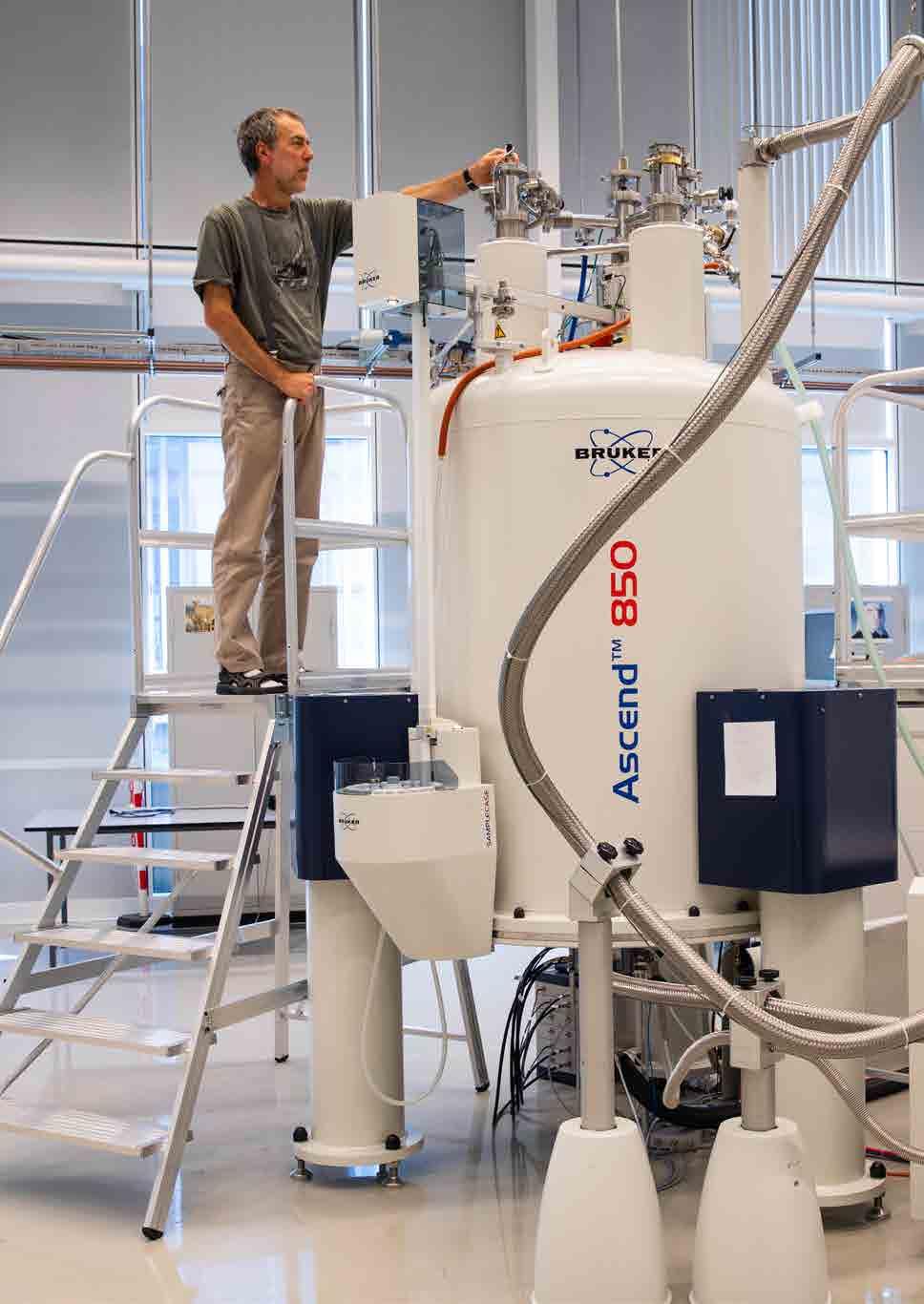
31 STRATEGIC PLAN FACULTY OF SCIENCE 2023 – 2028
Collaboration is crucial. Our existing and new partnerships help us strengthen our education, broaden the opportunities for our students and increase the impact of our research, for science and for society.
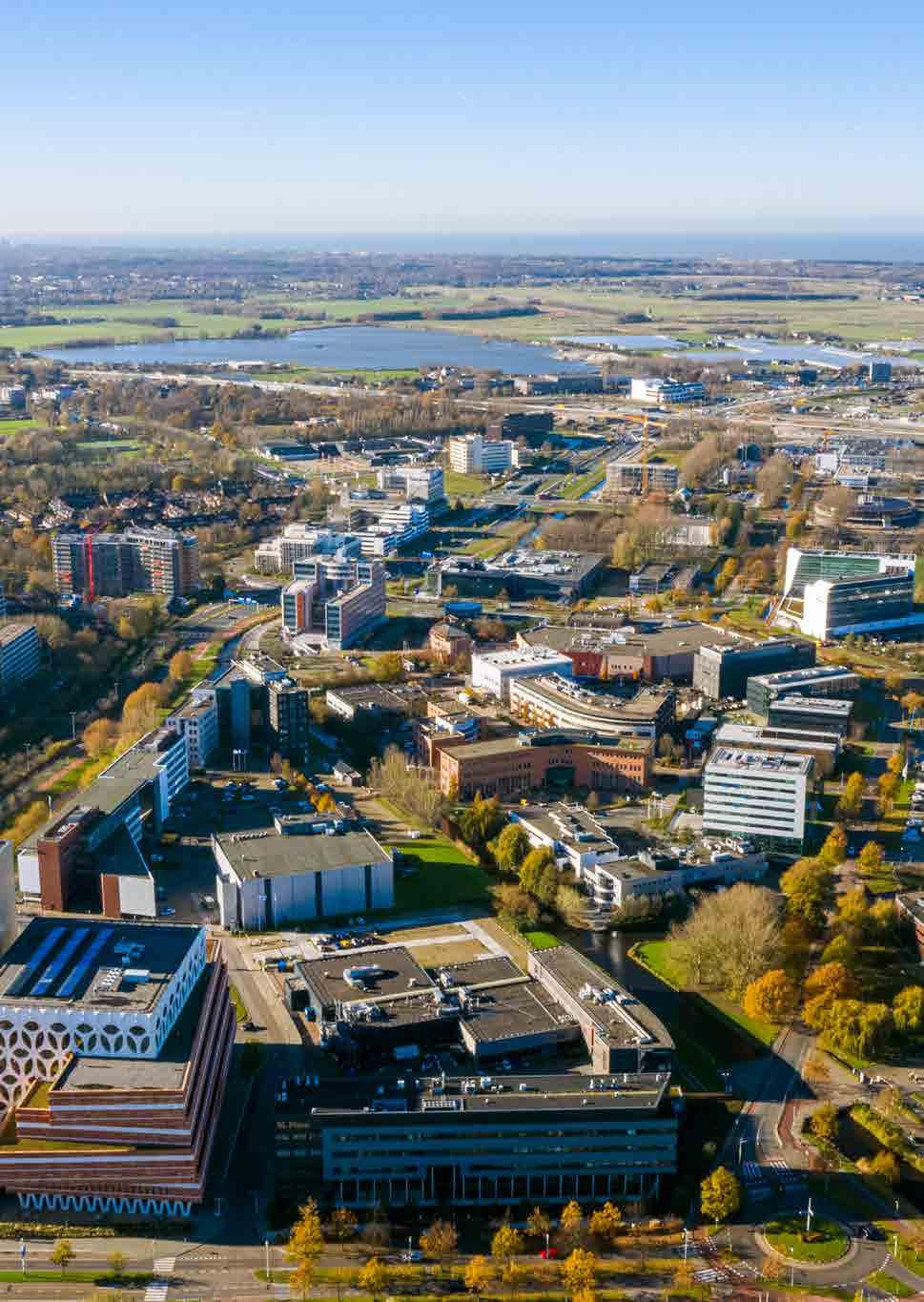
7
32
Our ecosystems
Added value from collaboration and investing in relationships
Working together makes us better. Connecting knowledge, skills and ideas is essential for talent development, the quality of our education and research, achieving societal impact and attracting funding. Collaboration increases our effectiveness and strengthens our reputation. As a faculty, we work closely with knowledge institutions as well as businesses, governments and nongovernmental organisations (NGOs). In the coming period, we aim particularly to strengthen our collaborations at the regional level, as well as a number of targeted international collaborations. We will do this by actively engaging with our networks, encouraging interdisciplinary collaboration from the bottom up and, where necessary, making use of our relations at management level to strengthen our position in relevant networks and consortia. Leiden Science is on board!
Regional collaboration
Our faculty is located in the heart of the Leiden Bio Science Park (LBSP), close to the NL Space Campus, TNO, Naturalis, the Leiden University Medical Center and the other university faculties. Together with the Leiden municipality, the province of South Holland and the university, we are developing the LBSP to become a dynamic innovation district and an important hotspot for Life Sciences & Health, where talented researchers and professionals, innovative companies and investors from throughout the world converge and collaborate. Together with our partners in the region, we make it possible for start-ups and spin-offs to establish themselves locally, thus creating an environment where our scientific insights can generate societal and economic impact. Within this environment, we promote the development of our Life Sciences & Health ecosystem, but also that of innovation hotspots for other natural sciences, such as quantum technology. We involve partners from the LBSP and the surrounding region in joint meetings to promote cooperation on our six research themes (chapter 6).
Leiden University, Delft University of Technology (TUD) and Erasmus University Rotterdam (EUR) together form a strategic alliance in South Holland to build a strong innovation ecosystem: Leiden-Delft-Erasmus Universities (LDE). As a faculty, we play a leading role in the interdisciplinary research centres and programmes within LDE. We also pursue collaboration in medical technology and health research via Medical Delta.
33 STRATEGIC PLAN FACULTY OF SCIENCE 2023 – 2028
National collaboration

National research collaborations have grown strongly in importance in recent years. Through sector plans and funding instruments such as the National Growth Fund, Gravity and Summit, the value of these collaborations is capitalised on and further strengthened. The faculty has a high level of success in this domain, participating in many national consortia and contributing to national policy development. We aim to continue this success by encouraging our researchers to get involved in the (national) organisation of their discipline or theme. Those who have a good national network are also expected to involve junior and international staff members in collaborations, so that they too can benefit from the opportunities this offers.
International collaboration
Science is not bound by country borders. Research and education at our faculty are based on a tradition of strong international focus, and we recognise this in our faculty’s close collaboration in education and research with partners across the whole world and in our diverse and inclusive community of students and staff. We align ourselves with the university’s vision on internationalisation. At faculty level, we are committed to cooperation within Europe within strong university networks and alliances, in particular The League of European Research Universities (LERU), UNA Europa and the Erasmus+ programme, which we make use of to influence policy, share good practices, exchange students and promote joint research with funding from Horizon Europe. Outside Europe, we follow the university’s regional policy and focus on a limited number of collaborations in research and education with preferred partners. To be successful in this, a basis of mutual trust has to be built and sustained, and relevant procedures streamlined.
International cooperation requires a good balance between enhancing opportunities and possibilities for our teaching and research on the one hand and recognising and mitigating the risks on the other. We work with the university on knowledge security policies and make our staff aware of the potential risks that international cooperation can bring. In doing so, we keep in mind that our research and education benefit greatly from international collaboration and that our international character is an essential element in our faculty’s strength. By dealing with these risks proactively and responsibly, we can maximise the benefits of international cooperation while protecting our staff, our students and our intellectual property.
Bringing the outside world in; active relationship management
We want to make better use of our network of students, PhD candidates and alumni. Through their careers in industry, government and academic institutions, they offer us opportunities to expand our networks and strengthen collaborations in the Netherlands and abroad. By developing and maintaining
34
our alumni network more structurally, we enrich the opportunities for collaborating in research and education. In general, driven by the interests of our research and teaching, we engage in proactive relationship management by facilitating and organising visits from and to partners and potential partners at home and abroad.
Actions
• Intensify the collaboration with our regional partners through more active relationship management and by involving them in our meetings on key themes.
• Make better use of the network of former students, PhD candidates and staff.

• Promote international collaboration, at individual and faculty level and work towards streamlining procedures that hamper collaboration.
• Together with the university, develop policies for knowledge security in order to protect our staff, students and intellectual property.
35 STRATEGIC PLAN FACULTY OF SCIENCE 2023 – 2028
Making this strategic plan meaningful and keeping it alive: that’s our aim. We’ll do that with enthusiasm and with one another. And with a clear implementation agenda as our guiding principle.
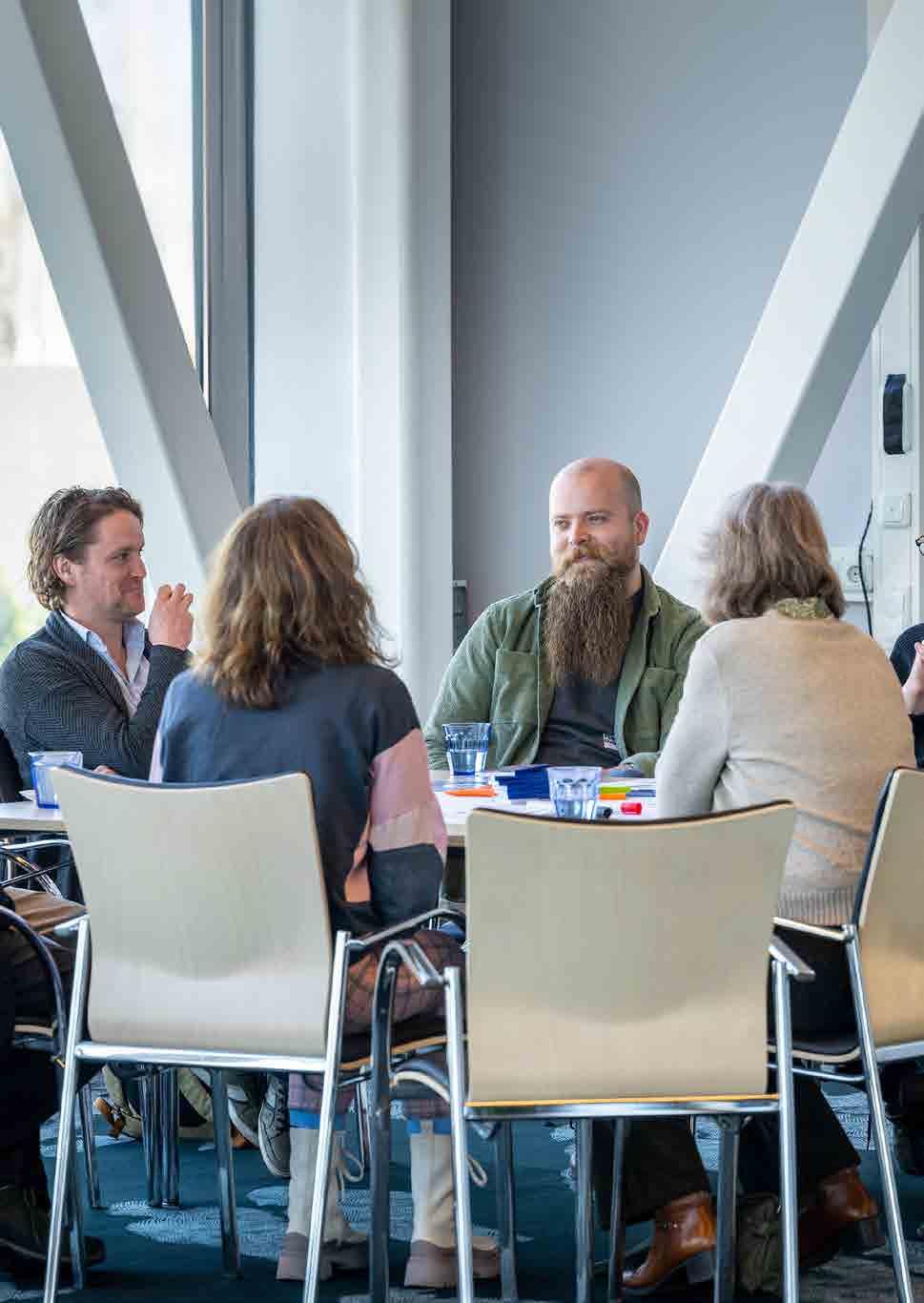
8
36
From strategy to realisation
The strategic plan heralds the start of a new period for our faculty. It sets the course for our choices and decisions over the coming years. To achieve this plan, we will formulate a faculty implementation agenda that will keep the strategy alive. The implementation agenda will reflect the university implementation agenda and enable us to set priorities and achieve the key actions of this strategy together. We will evaluate at regular intervals whether we are still on track or whether adjustments are needed.
Connection is paramount. Working together and sharing knowledge and experience are how we create commitment and how we are able to innovate. Relevant developments within and outside the faculty are discussed and coordinated within the university. As a faculty, we actively share knowledge with our colleagues in the rest of the organisation and participate in central programmes and projects. Encouraging interdisciplinary collaboration and promoting open and inclusive communication are key components for success.
In implementing the strategic plan, we will work together with our community in working groups and sounding board groups that include a diverse body of individuals from across our organisation. We will also look for new approaches to realise the projects in the implementation agenda in a smart and effective way. For instance, by linking up as much as possible with ongoing developments and initiatives and by setting up project teams. Our behaviour, culture and leadership will determine our success and the enjoyment we get from working together. Our core values are our guiding principle and they will therefore play a visible role in the coming years in achieving our strategic goals.
FWN
2023 – 2028:
We are a community where everyone feels at home. At our faculty, the basics are in order. People enjoy working and studying here and have ample opportunities to develop their talents. We believe that working together is important: within the faculty, in the region and further afield. Connecting through curiosity is the way forward.
37 STRATEGIC PLAN FACULTY OF SCIENCE 2023 – 2028
